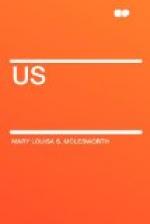“That’s the river where the boats are like houses—that Tim told us about,” said Pamela.
“Yes,” said Diana, “it’s the canal. It comes right into the town over that way,” and she pointed the left. “The boats take stone from hereabouts,—there’s lots of quarries near Crookford. I wanted you to see it, for we’ve been thinking, Tim and me—it’s more his thought than mine—that that’d be the best way for you to get away. Mick’ll not be likely to think of the canal, and Tim’s been down to see if there was any one among the boat-people as would take you. He used to know some of them not far from here. And the canal goes straight on to a place called Monkhaven, on the road to Sandle’ham. Did you ever hear of that place?”
The children shook their heads.
“Well, it can’t be helped. That’s as far as you can get by the canal. After that Tim must use his wits and look about him; and when you get to Sandle’ham I’m afraid there’s no help for it—you’ll have to ask the police to take you home.”
“But Tim too?” said Pamela. “Tim’s to go home with us.”
“I hope so,” said Diana. “I hope the old gentleman and lady will be good to him, poor boy! Tell them it was none of his fault, your being stolen away—he’s but a poor homeless waif himself; and even if so be as they could do nothing for him, he mustn’t come back here. Mick’d be like to kill him.”
“But Grandpapa and Grandmamma will be good to him. I know they will,” said Duke and Pamela together. “They’d be good to you too, Diana,” they added timidly.
But Diana again shook her head.
“That can’t be,” she said. “Still, when all this has blown over a bit, I’ll try to hear of you some day. Tim’ll maybe be able to let me know the name of the place where your home is.”
“And you must come to see us. Oh yes, yes—you must, Diana!” said the children, dancing about with glee. The girl looked at them in some surprise; it was the first time she had seen them merry and light-hearted as they were at home, and it made her better understand how wretched their new life must have been for them to change them so.
“I’ll try,” she said; “but it doesn’t much matter for that. The thing is for you to be safe at home yourselves.”
Then she said it was time to go back. It was quite dark by now, and the children kept very close to her as they found themselves again in the rabble of the behind-the-scenes of the fair. People there too were beginning to shut up for the night, for most of them, poor things, had been working hard all day.
As they came up to where Mick’s party had encamped, Diana said something in the queer language the children did not understand to some of the gipsies who were hanging about. Their answer seemed to relieve her.
“Come, children,” she said; “you must be tired. I’ll get you to bed as quick as I can; and try to get to sleep. It’s the best thing you can do.”—“They’ll not be coming just yet, maybe,” she added to herself, “if they’ve got to drinking over their bargain; so much the better perhaps. If only the children are asleep they’ll perhaps be none the wiser, and I’ll hear all there is to hear.”




